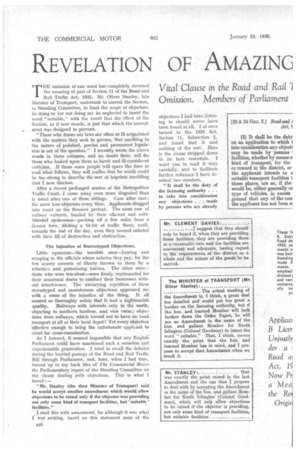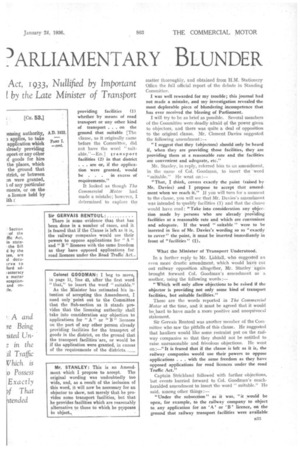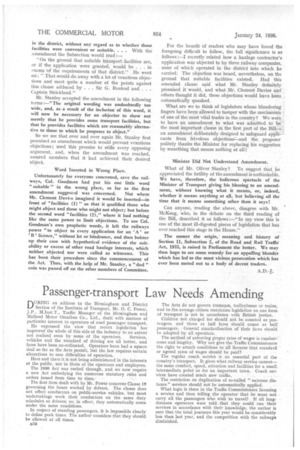REVELATION OF AMAZING
Page 42

Page 43

Page 44

If you've noticed an error in this article please click here to report it so we can fix it.
PARLIAMENTARY BLUNDER THE omission of one word has completely reversed the meaning of part of Section II of the Road and Rail Traffic .Act, 1933. Mr. Oliver Stanley, late Minister of Transport, undertook to amend the Section, in Standing Committee, to limit the scope of objectors. In doing so (or not doing so) he neglected to insert the word "suitable," with the result that the effect of the Section, as it now stands, is just that which the amend
, merit was designed to prevent.
"Those who frame our laws are often so ill-acquainted with the matters they seek to govern, that anything in the nature of polished, • precise and permanent legislation is out of the question." I recently wrote the above words in these columns, and no doubt there will •lee those who looked upon them as harsh and ill-considered critic.:sm. If those same people will spare the time to read what follows, they will realize that lio words could be too strong to describe the sort of hopeless muddling that I now disclose.
After a recent prolonged session at the Metropolitan Traffic Court, I came away even more disgusted than is usual after one of these sittings. Case after case : the same four objectors every time. Applicants dragged into court on the flimsiest pretext. The same row of railway vultures, headed by their efficient and coldblooded spokesman—pecking off a few miles from a licence here, filching a tit-bit of traffic there, until, towards the end of the day, even they seemed satiated with their fill of destruction and obstruction.
The Injustice of Stereotyped Objections.
Little operators—the sensible ones—bowing and scraping to the officials whose salaries they pay, for the few scanty morsels of liberty thrown to them by a reluctalit and patronizing bureau. The other ones— those who were truculent—were firmly reprimanded for their unnatural desire to conduct their businesses without interference. The unvarying repetition of these stereotyped and monotonous objections oppressed me with a sense of the injustice of the thing. It all seemed so thoroughly unfair that it had a nightmarish quality. Railways with interests only in the north, objecting to southern hauliers, and vice versa ; objections from railways, which turned out to have no road transport at all at their local depot Yet every objection effective enough to bring the unfortunate applicant to court for cross-examination.
As I listened, it seemed impossible that any English Parliament could have sanctioned such a senseless and objectionable persecution. .1 tried to recall the debates during the hurried passage of the Road and Rail Traffic Bill through Parliament, and, later, when I had time, turned up in my back files of The Commercial Motor the Parliamentary report of the Standing Committee on the clause dealing with objections. This is what I found :— "Mr. Stanley (the then Minister of Transport) said he would accept another amendment which would allow objections to be raised only if the objector was providing not only some kind of transport facilities, but ' suitable ' objections I had been listening to should never have been heard at all. I at once turned to the 1933 Act, Section 11, Subsection 2, and found that it said nothing of the sort. Here is the clause stripped down to its bare essentials. I want you to read it very carefully, and to facilitate further reference I have inserted two numbers.
"It shall be the duty of the licensing authority . . to take into consideration any objections . . . made by persons who are already providing facilities (1) whether by means of road transport or any other kind of transport . . . on the ground that suitable [The clause, as it originally came before the Committee, did not have the word " suitable."—E.D.] transport facilities (2) in that district . . . are or, if the application were granted, would be . . . in excess of requirements."
It looked as though The Commercial Motor had made a mistake; however, I determined to explore the
matter thoroughly, and obtained from H.M. Stationery Office the full official report of the debate in Standing Committee.
was well rewarded for my trouble; this journal had not made a mistake, and my investigation revealed the most deplorable piece of blundering incompetence that has ever received the blessing of Parliament.
I will try to be as brief as possible. Several members of the Committee were deadly afraid of the power given to objectors, and there was quite a deal of opposition to the original clause. Mr. Clement Davies suggested the following amendment:—
"I suggest that they (objectors) should only be heard if, when they are providing those facilities, they are providing them at a reasonable rate and the facilities are convenient and adequate, etc."
Mr. Stanley, in reply, referred him to an amendment, in the name of Col. Goodman, to insert the word "suitable." He went on :—
"That, .1 think, covers exactly the point (raised by Mr. Davies) and I propose to accept that amendment when we reach it." If you will turn for a moment to the clause, you will see that Mr. Davies's amendment was intended to qualify facilities (1) and that the clause would have read: "Take into consideration any objection made by persons who are already providing facilities at a reasonable rate and which are convenient and adequate. If the word " suitable" were to be inserted ht lieu of Mr. Davies's wording so as "exactly to cover" the point, it must be inserted immediately in front of "facilities" (1).
What the Minister of Transport Understood.
In a further reply to Mr. Lidclall, who suggested an even more drastic amendment, which would have cut out railway opposition altogether, Mr. Stanley again brought forward Col. Goodman's amendment aS soother, using the following words:— "Which will only allow objections to be raised if the objector is providing not only some kind of transport facilities, but suitable facilities."
These are the words reported in The Commercial Motor at the time, and it must be agreed that it would be hard to have made a more positive and unequivocal statement.
Sir Gervais Rentoul was another member of the Committee who saw the pitfalls of this clause. He Suggitecl that hauliers would like some restraint put on the railway companies so that they should not be entitled to raise unreasonable and frivolous objections. He went on:—" It is feared that if the clause is left as it is, the railway companies would use their powers to oppose applications . . . with the same freedom as they have opposed applications for road licences under the road Traffic Act."
Captain Strickland followed with further objections, but events hurried forward to Col. Goodman's muchheralded amendment to insert the word" suitable." He said, among other things :—
'Under the subsection" as it was, "it ,would be open, for example, to the railway company to object to any application for an 'A' or 'B ' licence, on the ground that railway transport facilities were available
in the district, without any regard as to whether those facilities were convenient or suitable. . . . With the amendment the Subsection would read:— " On the ground that suitable transport facilities are, or if the application were granted, would be . . . in excess 'of the requirements of that district." He went on: " That would do away with a lot of vexatious objections and meet quite a number of the points against this clause adduced by . . Sir G. Rentoul and . . . Captain Strickland."
Mr. Stanley accepted the amendment in the following terms :—" The original wording was undoubtedly too wide, and, as a result of the inclusion of this word, it will now be necessary for an objector to show not merely that he provides some transport facilities, but that he provides facilities which are reasonably alternative to those to which he proposes to object."
So we see that over and over again Mr. Stanley first promised an amendment which would prevent vexatious objections ; used this promise to stifle every opposing argument, and, when the amendment was reached, assured members that it had achieved their desired object.
Word Inserted in Wrong Place. Unfortunately for everyone concerned, save the railways, Col. Goodman had put his one little word " suitable " in the wrong place, so far as the first
amendment suggestmi was concerned. Not where Mr. Clement Davies imagined it would be inserted—in front of "facilities (1) " so that it qualified those who might object and those who might not object; but before the second word "facilities (2)," where it had nothing like the same power to limit objections. To use Col. Goodlman's own prophetic words, it left the railways power "to object to every application for an ' A ' or 'B' licence," without let or hindrance, and then bolster up their case with hypothetical evidence of the suitability or excess of other road haulage interests, which neither. objected nor were called as witnesses. This has been their procedure since the commencement of the Act. Thus, with the help of Mr. Stanley, a " dud " coin was passed off on the other members of Committee. For the benefit of readers who may have found the foregoing difficult to follow, the full significance is as
follows recently related how a haulage contractor's application was objected to by three railway companies, none of which operated in the district into which he carried; The objection was heard, nevertheless, on the ground that suitable facilities existed. Had this amended clause said what Mr. Stanley definitely promised it would, and what Mr. Clement Davies and others thought it did, these objections would have been automatically quashed.
• What are we to think of legislators whose blundering fingers have been allowed to tamper with the mechanism of one of the most vital trades in the country? We were to have an amendment to what was admitted to be the most important clause in the first part of the Bill— an amendment deliberately designed to safeguard applicants from frivolous objections—and the proposer politely thanks the Minister for replacing his suggestion by something that means nothing at all !
Minister Did Not Understand Amendment.
What of Mr. Oliver Stanley? To suggest that he appreciated the futility of the amendment is unthinkable. We have, therefore, the ludicrous spectacle of the Minister of Transport giving his blessing to an amendment, without knowing what it means, or, indeed, whether it means anything at all, but believing all the time that it means something other than it says!
Can anyone, reading theabove, disagree with Mr. McKeag, who, in the debate on the third reading of the Bill, described it as follows :—" In my view this is one of the most ill-digested pieces of legislation that has ever reached this stage in the House."
The sooner the origin, meaning and history of Section 11, Subsection 2, of the Road and Rail Traffic Act, 1933, is raised in Parliament the better. We may then hope to see some remedy for an appalling blunder which has led to the most vicious persecution which has ever been meted out to a body of decent traders.




















































































